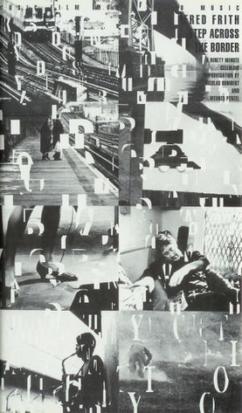 A ninety minute celluloid improvisation by Nicolas Humbert and Werner Penzel
A ninety minute celluloid improvisation by Nicolas Humbert and Werner Penzel"Improvisation" here refers not only to the music, but also to the film itself. Humbert and Penzel state in the 2003 DVD release of the film:
The music in the film is performed by Frith on his own, with others, and by others on their own. Some of the music is improvised, some is composed material performed "live", and some is previously recorded material played as accompaniment to many of the "movement" sequences in the film.
The recording of the film coincided with the formation and activity of Frith's review band Keep The Dog (1989–1991), and many of the participants of the band appear in the film. There are even a few rare glimpses of the band rehearsing. René Lussier in particular, features prominently and "interviews" Frith about his musical upbringing and approach to music.
The title of the film comes from the lyrics of the song "The Border", recorded by Skeleton Crewon their album, The Country Of Blinds (1986). A "video" of this song also appears in the film.
"knowing you're being filmed. not knowing. knowing, as you watch the screen, that you knew you were being filmed. knowing that you didn't know. the subtle degrees of self-consciousness. the vanity on seeing yourself on the screen, and the vanity of saying: "i can't stand to see myself on the screen" (because you don't come across as the perfectly balanced human being you know you really are!). trying in interviews to pinpoint the things that are important to you and discovering how elusive they are, how hard to define. as part of the same process, realizing how much of what you say is habit, something long ago formed into an opinion and reiterated without regard to changing circumstances and feelings. unlearning, finding yourself out. detachment as the only way to survive the experience, to escape from the false authority that the screen imparts, the inevitable partiality of it. and learning to de-emphasize things in your mind - it's only a film, it's not "you", just a few moments from a few moments. the importance of trust. knowing that the filmmakers came from a love of the music; not to make money, not to be fashionable, not to promote something and not to fulfil an agenda. not trying to control the results. this is nico's and werner's film, not mine, and i couldn't change their way of seeing things even if i wanted to. improvisation. accepting your luck. in the end, shock at how close the pictures are to the spirit of the music. such poignant images, such musical editing. and: the audience experiences the action in the present, but for me it's always the past, a summing up. seeing the film allows me to shade this past like a skin. far from feeling constricted or defined, i am somehow liberated into my own present. i didn't expect this..." (fred frith, 1990)
DVD rip_VO_with French Subtitles
[RS] link: 1, 2, 3, 4, 5, 6





2 comments:
Hi 7-12 HR
I'm very curious about the movie. But looks to me like the *rar archive are pwd protected, may you please so nice ...
thanks
thnx
Post a Comment